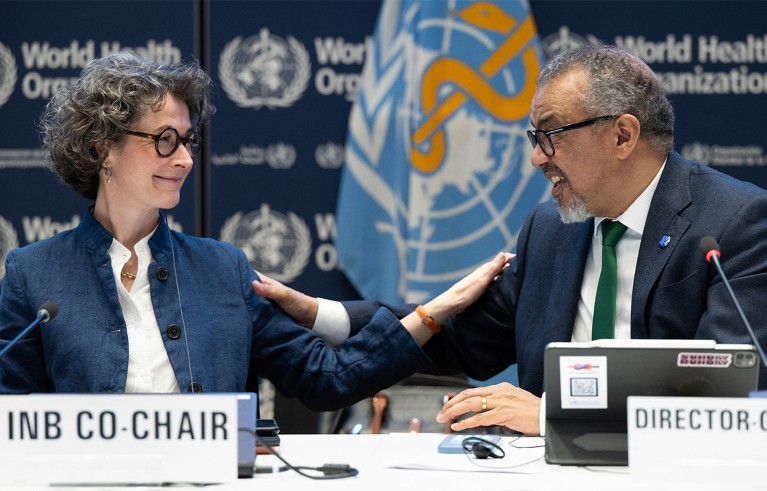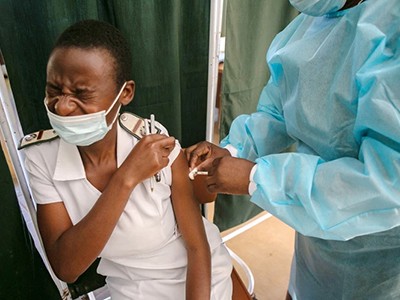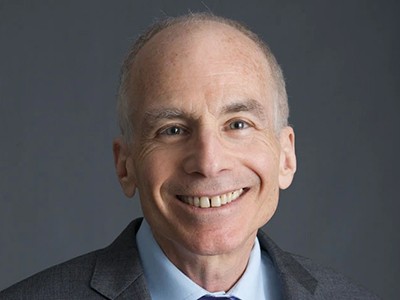You have full access to this article via your institution.

Anne-Claire Amprou, co-chair of the pandemic treaty talks, with WHO director-general Tedros Adhanom Gebreyesus at the talks’ conclusion.Credit: Christopher Black/WHO/AFP/Getty
“I’m overwhelmed, overjoyed!” These were the words of Precious Matsoso, co-chair of the World Health Organization (WHO) group tasked with negotiating the first global treaty on preventing and responding to pandemics. She was speaking to Nature shortly after a historic accord was agreed in the small hours of 16 April at the WHO headquarters in Geneva, Switzerland.

First global pandemic treaty agreed — without the US
The draft treaty represents the first time the world has agreed the bare bones of a plan focused on prevention of, preparedness for, and response to a pandemic. It took more than 3 years and 13 formal rounds of meetings to negotiate.
At times, there were reasons to think the negotiations might fail, including seemingly intractable disagreements between countries at different income levels. That was even before the announcement in January, after the election of Donald Trump as president, that the United States intended to withdraw from the WHO and would take no further part in the treaty talks.
The text agreed in Geneva is not as strongly worded as some health-equity proponents would have liked. But it lays the groundwork for measures that could save lives when the next pandemic strikes — ensuring that vaccines quickly get to those that need them most and increasing the sharing of knowledge about pathogens, as well as of vaccines, drugs and how to make them.

Negotiating a pandemic treaty is just the first step — how will countries comply?
That an agreement was eventually forged sends a powerful signal about the power of collaboration and multilateralism in a world where such approaches seem to be waning. One legal scholar who worked with the WHO to draft the treaty told Nature that the US exit actually accelerated its signing — by spurring other countries to demonstrate the importance of collaboration. The treaty was agreed “not in spite of Trump, but because of Trump”, says Lawrence Gostin, a specialist in health law and policy at Georgetown University in Washington DC.
At one point, the talks were stuck because lower-income countries wanted guarantees of improved access to drugs and vaccines in a future pandemic, whereas higher-income countries were concerned that demands to share intellectual property and products could stifle the very innovation needed during a pandemic. Compromise was reached on the understanding that the transfer of technology would be voluntary and on “mutually agreed” terms.
Access and equity
One part of the treaty that countries will now work out in detail is known as Pathogen Access and Benefits Sharing (PABS). This grants pharmaceutical companies access to scientific data, such as pathogen samples and genomic sequences, in return for more-equitable sharing of drugs, vaccines and diagnostics during a pandemic.
Countries have agreed the outlines for how sharing will work — including the proviso that, during a pandemic, at least 20% of the vaccines, drugs and diagnostics produced by participating manufacturers will be made available to the WHO, which will distribute them according to need. The task of making this aspect of the treaty operational will fall to a future working group. How it is implemented could determine the treaty’s ultimate success.

The pandemic treaty: a grand global social bargain
A key concern for researchers is that nations do not inadvertently make data-sharing more difficult during a pandemic, for example, by creating systems that impede the free flow of data. To safeguard against this, scientists with experience of running open data-sharing systems must be included in the process to define the PABS system — as they have been so far in the treaty-negotiation process.
Unlike COVAX, the unsuccessful attempt to share vaccines more equitably during the COVID-19 pandemic, the pandemic accord will be legally binding. The text must be agreed by the world’s health ministers at the World Health Assembly in Geneva later this month. After that, to become international law, at least 60 countries must incorporate it into their own national laws, a process called ratification.
The story will not end there, because international law can be notoriously difficult to enforce. Ensuring that vaccines and drugs — and the knowledge to make and use them effectively — really are equitably distributed in the next pandemic will also require the will and support of national governments and pharmaceutical manufacturers. Furthermore, it will depend on these parties trusting each other.
So far, researchers, non-governmental organizations and drug companies have been consulted as part of the negotiations. It is important that this inclusion continue as the treaty moves from negotiation to implementation. This will help to ensure that innovation and the principles of open science are preserved and built on in the next pandemic, alongside equity of access.


